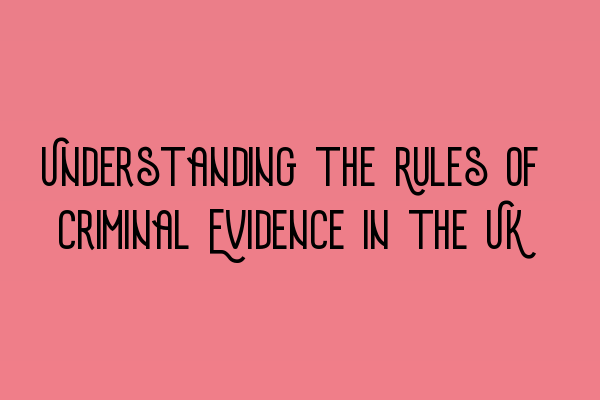Understanding the Rules of Criminal Evidence in the UK
When it comes to criminal law in the UK, understanding the rules of criminal evidence is of utmost importance. Properly preserving, presenting, and disputing evidence can make all the difference in a criminal case. As a solicitor at SQE Criminal Law & Practice Law UK, I am well-versed in the intricacies of criminal evidence and the impact it has on the outcome of a case.
To gain a comprehensive understanding of criminal evidence rules, it is essential to familiarize yourself with the concepts, principles, and procedures involved. Let’s delve into the key aspects of criminal evidence and equip you with the necessary knowledge.
1. Admissibility of Evidence
The admissibility of evidence refers to whether a specific piece of evidence is permissible in court. The UK legal system follows strict rules on what can and cannot be presented as evidence. Certain information, such as hearsay and unlawfully obtained evidence, may be deemed inadmissible. Therefore, it is crucial to understand the admissibility criteria to build a strong case.
2. Types of Evidence
There are various types of evidence that can be presented in criminal cases. These include:
– Documentary evidence: Written documents, contracts, emails, or text messages that serve as proof.
– Forensic evidence: Scientific evidence gathered from crime scenes, such as DNA, fingerprints, or ballistics.
– Witness testimony: Statements given by individuals who have relevant knowledge or witnessed the crime.
– Expert evidence: Opinions or interpretations provided by professionals with specialized knowledge, such as forensic scientists or handwriting experts.
3. Burden and Standard of Proof
In criminal cases, the burden of proof lies with the prosecution. They must prove the defendant’s guilt beyond a reasonable doubt. This high standard ensures the accused is protected from wrongful convictions. As a solicitor, it is essential to challenge the prosecution’s evidence and raise doubts about their case.
4. Chain of Custody
Maintaining the chain of custody is crucial in preserving the integrity of evidence. This refers to the documentation of every individual who had control or possession of the evidence from the time it was collected until it reaches the courtroom. Any breaks or inconsistencies in the chain of custody can challenge the authenticity and reliability of the evidence.
5. Examination and Cross-Examination of Witnesses
The examination and cross-examination of witnesses play a vital role in criminal trials. As a solicitor, it is crucial to ask strategic questions to elicit relevant information and challenge the credibility of the witness. A well-executed cross-examination can weaken the prosecution’s case and strengthen the defense.
For further practice and preparation, consider taking advantage of our SQE 1 Practice Exam Questions and SQE 1 Practice Mocks FLK1 FLK2. These resources will provide you with ample opportunities to test your understanding of criminal evidence and familiarize yourself with the exam format and style.
6. Expert Testimony
Expert witnesses can provide invaluable insights and opinions based on their specialized knowledge. In criminal cases, expert testimony can help explain complex scientific evidence to the judge and jury. However, it is important to assess the credibility and expertise of the expert witness to ensure their testimony holds weight in court.
To enhance your expertise and understanding of expert testimony, explore our SQE 2 Preparation Courses. These courses will equip you with comprehensive knowledge to effectively present and challenge expert evidence.
7. Importance of Legal Research
Staying up-to-date with legal precedents, statutes, and case law is crucial for any solicitor dealing with criminal evidence. Conducting thorough legal research can help you find relevant cases and legislation to support your arguments and strengthen your case. It is always beneficial to explore reliable resources and keep yourself informed about recent developments in criminal evidence rules.
To further streamline your preparation for the SQE exams and stay informed about SRA SQE Exam Dates, make use of our SQE 1 Preparation Courses. These courses are designed to equip you with the necessary knowledge and skills to excel in your criminal law career.
In conclusion, understanding the rules of criminal evidence is crucial for any solicitor practicing criminal law in the UK. By familiarizing yourself with admissibility criteria, types of evidence, burden of proof, chain of custody, witness examination, expert testimony, and legal research, you will be well-prepared to handle criminal cases effectively.
Remember to visit the related articles linked throughout this post, such as SQE 1 Practice Exam Questions, SQE 1 Practice Mocks FLK1 FLK2, SQE 2 Preparation Courses, SQE 1 Preparation Courses, and SRA SQE Exam Dates. These resources will further enhance your knowledge and help you excel in your legal career.
If you have any further questions or require legal assistance, please do not hesitate to contact SQE Criminal Law & Practice Law UK. Our team of experienced solicitors is here to support and guide you every step of the way.
